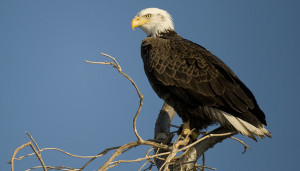
DAGSBORO, DELAWARE (3/20/2016) The deaths of several bald eagles found in Sussex County over the weekend are being investigated by state natural resources police.
One eagle was found dead near Dagsboro on Saturday morning, and three others died after being taken to Tri-State Bird Rescue near Newark.
Those three birds were among a group of eagles found disoriented in a field in the Piney Neck area, about a mile from where the first dead eagle was found, police said.
Three eagles in that group flew from the area before they could be captured for evaluation.
“We don’t know how many eagles may have been affected, so we are asking the public to notify us immediately should they see birds that appear sick,” said Sgt. John McDerby of Fish & Wildlife Natural Resources Police.
He said two birds taken Saturday afternoon to Tri-State Bird Rescue remain under care.
U.S. Fish & Wildlife Service agents are expected to join in the investigation into the eagle deaths today.
“This is an active investigation and we do not know what has caused the eagles to become sick and die,” he said.
“We’re also asking people not to attempt to capture or handle any eagles they encounter on the ground. These eagles will already be distressed so handling them could cause additional injuries to the eagle and possibly to anyone trying to help them,” McDerby said.
Sick or injured eagles can be reported to the natural resources police dispatch center at 800-523-3336.
Anyone with information about the dead eagles is urged to call the 24-hour Operation Game Theft hotline at 800-292-3030. All Operation Game Theft calls are kept confidential by the Department of Natural Resources and Environmental Control, McDerby said.
A group of 13 bald eagles was found dead Feb. 20 near Federalsburg, Maryland, and a federal investigation found they did not die of natural causes. U.S. Fish & Wildlife Service is offering a $25,000 reward to anyone who can lead to the person or persons responsible, McDerby said.